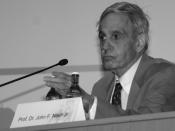Thomas Szasz once said, if you talk to God, you are praying; if God talks to you, you have schizophrenia.
It is a terrible disorder that affects many people around the world. Arguably the most famous person with schizophrenia is Nobel Prize (1994) and American Mathematicians Society's Leroy P. Steel Prize for Seminal Contribution to Research (1999) winner, John Nash.
Paranoid Schizophrenia can be a crippling illness. Its sufferers may not be able to determine what is real and what is not. According to Dr. Paul Ballas (2006: Internet) of the Department of Psychiatry at Thomas Jefferson University, the individual has feelings of being persecuted or plotted against. Affected individuals may have grandiose (over-the-top) delusions associated with protecting themselves from the perceived plot. The key symptoms are delusions and auditory hallucinations. Paranoid schizophrenia usually does not involve the disorganized speech and behavior that is seen in other types of schizophrenia.
Patients with paranoid schizophrenia typically are tense, suspicious, guarded, and reserved. There are no physical tests being used in mainstream medicine as yet to diagnose schizophrenia. However certain tests are performed to eliminate other disorders or illnesses that have similar symptoms. Schizophrenia.com (2007: Internet) states these possible disorders include seizure disorders, metabolic disorders, thyroid dysfunction, brain tumour and drug use. Currently, there is research being performed in various Universities in the United States into new physical tests to confirm schizophrenia. They are experimenting with blood tests, special IQ tests, eye tracking, brain imaging and smell tests. It will be a few more years before the results can be confirmed. For now a Psychiatrist must diagnose a person with schizophrenia. Usually a person suffering from the disorder will exhibit positive (hallucinations), negative (poor social functioning) and cognitive (difficulty concentrating) reactions. To diagnose a person with schizophrenia, a person must display:â¢Characteristic symptoms:...


